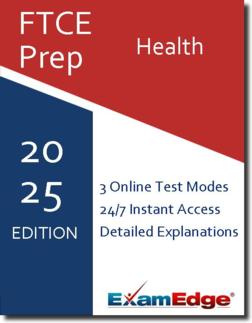FTCE Health (019) Practice Tests & Test Prep by Exam Edge - Topics
Based on 34 Reviews
- Real Exam Simulation: Timed questions and matching content build comfort for your FTCE Health test day.
- Instant, 24/7 Access: Web-based FTCE Health K-12 practice exams with no software needed.
- Clear Explanations: Step-by-step answers and explanations for your FTCE exam to strengthen understanding.
- Boosted Confidence: Reduces anxiety and improves test-taking skills to ace your FTCE Health K-12 (019).

Understanding the exact breakdown of the FTCE Health K-12 test will help you know what to expect and how to most effectively prepare. The FTCE Health K-12 has 100 multiple-choice questions The exam will be broken down into the sections below:
| FTCE Health K-12 Exam Blueprint | ||
|---|---|---|
| Domain Name | % | Number of Questions |
| Knowledge of the foundation, theories, and principles of health education | 6% | 6 |
| Knowledge of health education standards and health literacy | 6% | 6 |
| Knowledge of health education instructional strategies | 10% | 10 |
| Knowledge of personal health behaviors and wellness | 6% | 6 |
| Knowledge of human anatomy and physiology | 6% | 6 |
| Knowledge of pathology and prevention of human diseases and disorders | 6% | 6 |
| Knowledge of interpersonal health | 8% | 8 |
| Knowledge of sexual health | 9% | 9 |
| Knowledge of nutrition and physical fitness | 7% | 7 |
| Knowledge of mental and emotional health | 7% | 7 |
| Knowledge of substance use, abuse, and dependency and addictive behaviors | 9% | 9 |
| Knowledge of violence prevention and intervention | 7% | 7 |
| Knowledge of consumer health-related practices and media literacy | 3% | 3 |
| Knowledge of community health | 3% | 3 |
| Knowledge of environmental health | 3% | 3 |
| Knowledge of unintentional injury and safety practices | 4% | 4 |


